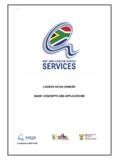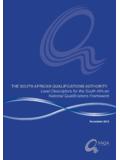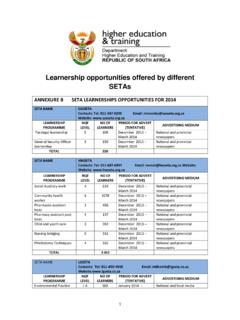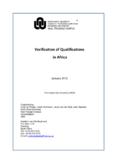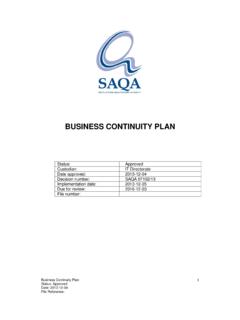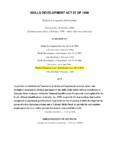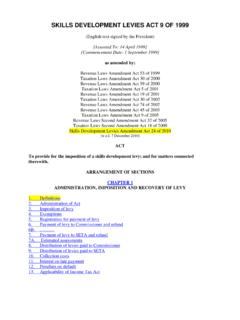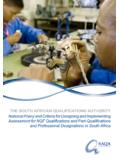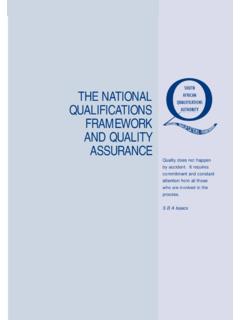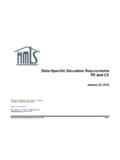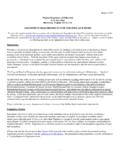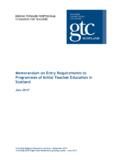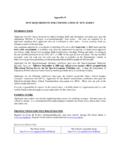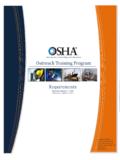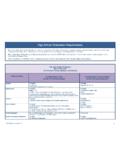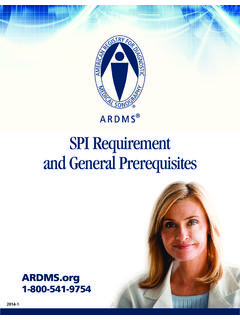Transcription of General Education and Training Certificate (GETC) - …
1 General Education and Training Certificate (GETC)The primary purpose of theGETC is to equip learnerswith the values, knowledgeand skills that will enable orenhance meaningfulparticipation in society,contribute towardsdeveloping sustainablecommunities, provide abasis for learning in furthereducation and Training , andestablish a firm foundationfor the assumption of aproductive and responsiblerole in the DOCUMENTF unded by the European Union under the European Programmefor Reconstruction andDevelopmentWrite to us atPostnet Suite 248, Private Bag X06 WATERKLOOF, 0145 Visit us at659 Pienaar Street (cnr. Waterkloof Road)BROOKLYN, PretoriaTelephone us at012 482 0800 Switchboard012 482 0802 Executive Office012 482 0836 Resource Centre and General information012 482 0810 Strategic Support012 482 0810 Communications012 482 0807 Standards Setting and Development012 482 0805 Quality Assurance and Development012 482 0858 Evaluation of Educational QualificationsFax us at012 346 5813 Executive Office012 482 0953012 346 5809 Secretariat012 482 0966012 346 5809 Communications012 482 0957012 346 5809 Information Technology012 482 0957012 482 0907 Standards Setting and Development012 482 0992012 482 0991012 482 0817 Quality Assurance and Development012 482 0905012 482 0895 Evaluation of
2 Educational Qualifications012 460 2131 Resource Centre012 482 0891e-mail us our website of publication: October 2001 ISBN: 0-620-28289-4 CONTENTSE xecutive summary31. Introduction52. Background to establishing the purpose, guiding principlesand criteria for the GETC53. Specific design challenges at the GETC level94. requirements of the General Education and Training Certificate95. Issues of implementation256. Conclusion27 Members of the GETC Stakeholder Forum28 References29 Glossary30 Acronyms32 SAQA s MissionTo ensure the development and implementation of aNational Qualifications Framework which contributes tothe full development of each learner and to the social andeconomic development of the nation at Education AND Training CERTIFICATEGETCE xecutive summaryRequirements1.
3 Each full qualification registered at level 1 on the NationalQualifications Framework (NQF) will be called a General Educationand Training Certificate (GETC) and will conform to the broad require-ments recommended in this document. 2. Each GETC will provide access to various learning pathways, both ver-tical and horizontal, in terms of the purpose of the qualification. Thescope of access provided by each GETC will be determined by the quali-fication The primary purpose of the GETC is to equip learners with the values,knowledge and skills that will enable or enhance meaningful participa-tion in society, contribute towards developing sustainable communities,provide a basis for learning in further Education and Training , and esta-blish a firm foundation for the assumption of a productive and respon-sible role in the A minimum of 120 credits is required for the GETC.
4 Of which at least72 must be at NQF level The 20 compulsory credits in language and communication must beobtained at NQF level 1 in one of the 11 official South African lang-uages (Sepedi, Sesotho, Setswana, siSwati, Tshivenda, Xitsonga,Afrikaans, English, isiNdebele, isiXhosa, or isiZulu) or in one of thelanguages promoted by the Pan South African Language Board (theKhoi, Nama, and San languages, and sign language) in terms of theSouth African Constitution (Chapter 1, Section 6; RSA, 1996).6. A further 20 credits in language and communication may be obtained inan additionalofficial language enshrined in the South AfricanConstitution (RSA, 1996) or in one of the languages promoted by thePan South African Language Board (the Khoi, Nama, and San lang-uages, and sign language)
5 In terms of the South African The 16 credits from the organisational field of mathematics and mathe-matical literacy must be obtained at NQF level The principle is accepted that proposers of a certain qualification candesignate specific areas of study or credits as compulsory within thatqualification, in addition to the fundamentals and in compliance withother GETC requirements and regulations as established by Proposers of qualifications must liaise with the Education and TrainingQuality Assurance bodies (ETQAs) which quality assure the learningprogrammes leading to the awarding of the GETC on the requirementsfor ensuring coherence of those A registered GETC can be a unit standards-based or non-unit standards-based qualification, in accordance with the requirements of the NationalStandards Bodies (NSB) regulations (8[4]).
6 Unit and non-unit stan-dards-based GETCs should articulate on the basis of their exit-level Learners not meeting the requirements to be awarded the GETC mustreceive a statement of achievement, reflecting the credits obtained oroutcomes publication of the South African Qualifications Authority312. Providers and ETQAs should engage with each other, with stakeholdersin their sectors, and with SAQA on how best to maintain the integrity ofthe GETC beyond the requirement that the purpose of the qualificationbe achieved through appropriate incorporation of integrated assessment. 13. ETQAs and providers of learning programmes leading to the achieve-ment of the GETC should collaborate in formulating policies and devi-sing criteria that allow learners to achieve whole or part qualificationsthrough the recognition of prior Education AND Training CERTIFICATE4A publication of the South African Qualifications Authority1.
7 IntroductionThe need for a document that provides a framework within whichconstructors of qualifications can design a GETC is indicated by: Broad stakeholder demand for guidance in the development of theGETC; The difficulties which NSBs and Standards Generating Bodies(SGBs) have experienced in conceptualising the qualification; and The requirement for the registration of a coherent GETC on policy document outlines the context within which the GETC islocated and discusses some of the difficulties associated with thedesign of the GETC. It addresses particular issues, which construc-tors of the GETC need to take into account, namely: The purpose of the GETC; Rules of combination; The articulation of the GETC; Progression and credit accumulation; Integrated assessment; and Recognition of prior learning (RPL).
8 The document outlines a number of requirements in addressing theseissues. The final section highlights some of the issues that need to betaken into account during implementation of the requirements con-tained in section Background to establishing the purpose,guiding principles and criteria for the The legal responsibility of SAQA as per the SAQA Act(Act No. 58 of 1995) (RSA, 1995)The functions of the Authority as per the SAQA Act, No. 58 of 1995,are as follows:The Authority shall: Oversee the development of the NQF; Formulate and publish policies and criteria for: The registration of bodies responsible for establishing educationand Training standards or qualifications; The accreditation of bodies responsible for monitoring andauditing achievements in terms of such standards or qualifica-tions; Oversee the implementation of the NQF including; Registration or accreditation of bodies referred to above and theassignment of functions to them.
9 General Education AND Training CERTIFICATEGETCA publication of the South African Qualifications Authority5In accordance withthe Act and theregulations, SAQA,through the NSB-SGB structures, isresponsible for theregistration ofqualifications. The registration of national standards and qualifications; Steps to ensure compliance with provisions for accreditation;and Steps to ensure that registered standards and qualifications areinternationally The Regulations for National Standards Bodies (NSBs)(RSA, 1998a) and for Education and Training QualityAssurance Bodies (ETQAs) (RSA, 1998b)Among the functions of NSBs as listed in the regulations are thatthey: Ensure that the work of SGBs meets the requirements for the regis-tration of standards and qualifications as determined by theAuthority; Recommend the registration of standards on the NQF to theAuthority.
10 Recommend the registration of qualifications to the Authority; Update and review qualifications; and Liaise with ETQAs regarding the procedures for recommendingnew standards and qualifications, or amending registered stan-dards and the functions of ETQAs as listed in the regulations are thatthey: Recommend new standards and qualifications to NSBs for con-sideration; or Recommend modifications to existing standards or qualificationsto NSBs for accordance with the Act and the regulations, SAQA, through theNSB-SGB structures, is responsible for the registration of qualifica-tions. Furthermore the NSBs have the function of liaising withETQAs regarding the procedures for recommending new standardsand qualifications, or amending registered standards and qualifica-tions.
